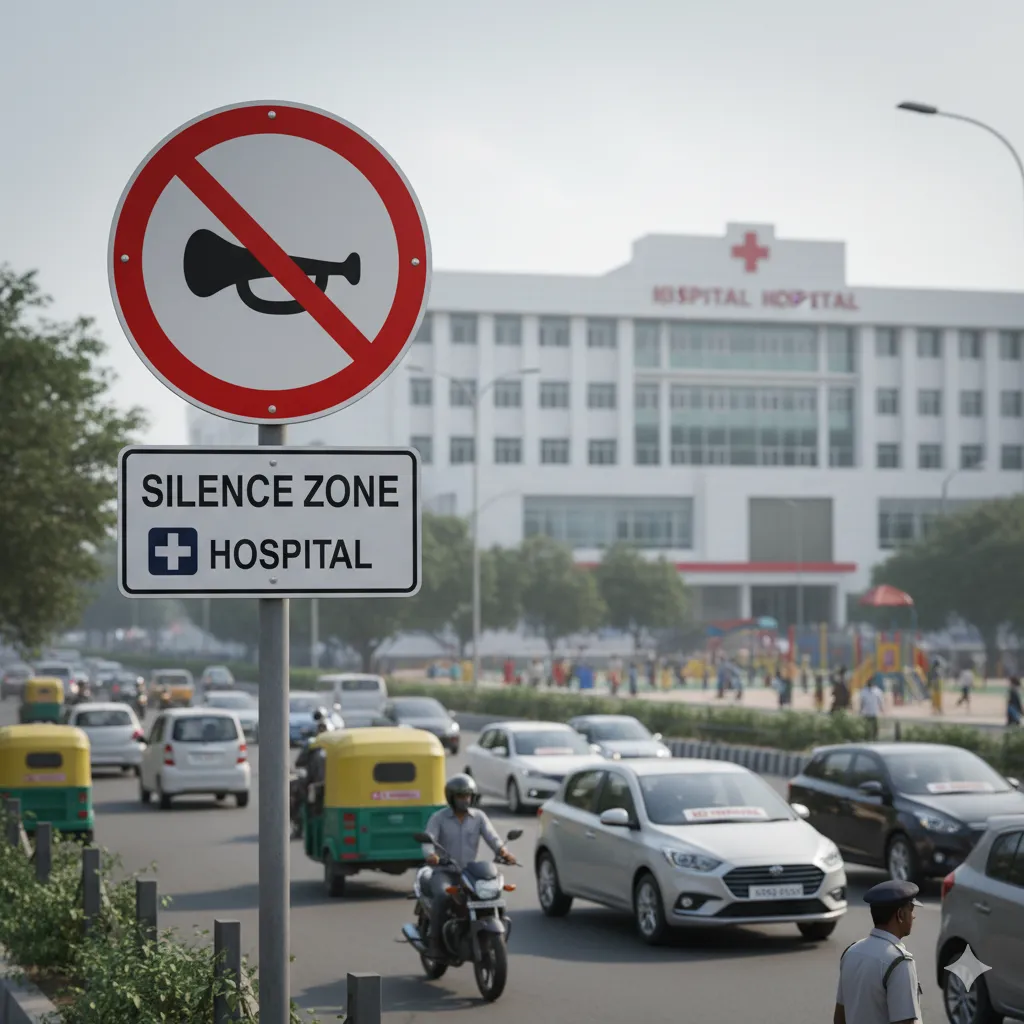speak for ACKO
speak for ACKO
speak for ACKO
Home / Motor Insurance / Articles / Traffic Rules / Fines for Continuous Honking in Silence Zones
Fines for Continuous Honking in Silence Zones
Saumya SrivastavaNov 20, 2025
Share Post
If you think safe driving is only about following traffic signals and being mindful, think again! It involves responsible behaviour, such as avoiding needless honking, as it could lead to stress and noise pollution.
Furthermore, honking unnecessarily, especially where a traffic sign prohibits it, can lead to a honking challan in India. You could be charged ₹1000 for the first offence and ₹2000 for subsequent ones.
So, to know more about the continuous honking penalty and the silence zone traffic rules, keep reading.

Contents
What are the Fines for Continuous Honking in Silence Zones?
Silence zones refer to areas within 100 metres of courts, hospitals and educational institutions. These areas are identified by the competent authorities. In such areas, the permissible noise level is between 40dB and 50dB.
As per Section 194F of the Motor Vehicle Act of 1988, and the Noise Pollution Rules of 2000, a continuous honking penalty for offenders is ₹1000 for the first offence and ₹2000 for subsequent ones. Not only that, but there are also penalties for violating decibel limits and creating a public nuisance, like:
Using pressure horns, which generate sound at a higher decibel than normal horns, can result in a fine.. For example, Delhi traffic police can issue a honking fine of up to ₹12,000 using such horns.
Sounding horns at night (from 10 pm to 6 am) in a residential area will attract a minimum ₹1000 honking fine in India.
Using loudspeakers at night will lead to a fine of ₹200 (depending on where you live).
Why Is It Necessary to have a Horn Usage Restriction in India?
The Indian Medical Association has stated that hearing noise more than 80 decibels for 6 to 8 hours a day and five days a week could lead to deafness and mental disorder. Therefore, the following are legally permissible noise levels in India:
The maximum sound limit permissible for a silence zone is 50 decibels during the daytime and 40 decibels at night.
It is 75dB during the day and 70dB at night in industrial areas.
Between 55dB during the day and 45dB at night in residential areas.
Within the 65dB in daytime and 55dB at night in commercial areas.
However, in most cases, especially in urban areas, traffic noise exceeds the normal range. You can even see this reflected in UP challan check, as many violations are linked to excessive horn use and noise pollution.
For example, unregulated cacophony in Bangalore traffic has made headlines as it contributes to public health hazards, including stress, fatigue and hearing loss. According to police data, 5,743 cases have been registered for using “shrill” noises, and there have been 49 cases of horns in prohibited places only between January and July this year.
Which Horns Can Help to Avoid Noise Pollution Fine India?
Even though we are talking about honking fines in India, not all horns are bad. In fact, sometimes horns help in navigating the Indian traffic in a better manner. Here are some functional horns:
OEM Horns: Original Equipment Manufacturers or car manufacturers built these traffic-compliant horns.
Electric Horns: These are simpler to install and legally compliant.
Dual Tone Horns: These horns are great at being intrusive attention-seekers, provided they are properly certified and installed.
The Bottom Line
A moment of restraint while you are driving can go a long way. It becomes evident that you drive responsibly and avoid unnecessary honking in silence zones not only to stay away from the honking fine in India, but also because you are a responsible and considerate road user. If you are not sure about whether a particular decibel of your vehicle's horn is legally permissible or not, ensure it’s a single-tone horn that doesn’t exceed 100 decibels at a distance of 7.5 metres.
Looking for a simple and easy traffic challan check and payment platform? Then choosing ACKO is a great option. A single platform that handles your vehicle insurance and traffic challan payments with a few clicks.
Frequently Asked Questions
What are the fines for continuous honking in silence zones?
In India, if a driver is caught honking horns in a silent zone, as per the Motor Vehicles Act (1988), they have to pay ₹1000 for the first offence and ₹2000 for subsequent offences.
Are honking horns illegal in India?
No, honking horns is not entirely illegal in India; however, excessive honking, particularly in silent zones, is illegal. According to the law, a sound level of 100 decibels at a distance of 7.5 metres is allowed. Anything beyond this limit leads to a hefty fine in India.
What is the Car horn decibel limit in India?
The legally recognised car horn decibel limit in India ranges from 93 dB to 112 dB when measured at a distance of 7 meters.
Can I challenge a honking fine in India?
Yes, to challenge a honking fine in India, you need proper evidence. Before contesting, download a copy of the e-challan and collect all necessary evidence, including witness statements, proof of your location at the time of the alleged violation, etc. Once the proofs are ready, you can contest the challan online or offline.

Was this article helpful?

Recent
Articles
How to Transfer a Car Insurance to a New Owner in India
Nikhila PS Dec 31, 2025
10 Tips to Reduce Your Car Insurance Premium
Team Acko Dec 30, 2025
How to Choose the Right Travel Insurance Policy?
Team Acko Dec 30, 2025
Moratorium Period in Life Insurance
Neviya Laishram Dec 29, 2025
Who is an Appointee in Life Insurance?
Neviya Laishram Dec 22, 2025
All Articles
Want to post any comments?
Check Traffic Challans Instantly ⚡️
Enter your vehicle number
Check your challans
